外研版(2019)选择性必修 第四册Unit 3 The world meets China Period 3 Using language—Review:adverbial clause 课件(共3
文档属性
| 名称 | 外研版(2019)选择性必修 第四册Unit 3 The world meets China Period 3 Using language—Review:adverbial clause 课件(共3 |  | |
| 格式 | pptx | ||
| 文件大小 | 2.1MB | ||
| 资源类型 | 教案 | ||
| 版本资源 | 外研版(2019) | ||
| 科目 | 英语 | ||
| 更新时间 | 2023-05-24 20:08:47 | ||
图片预览


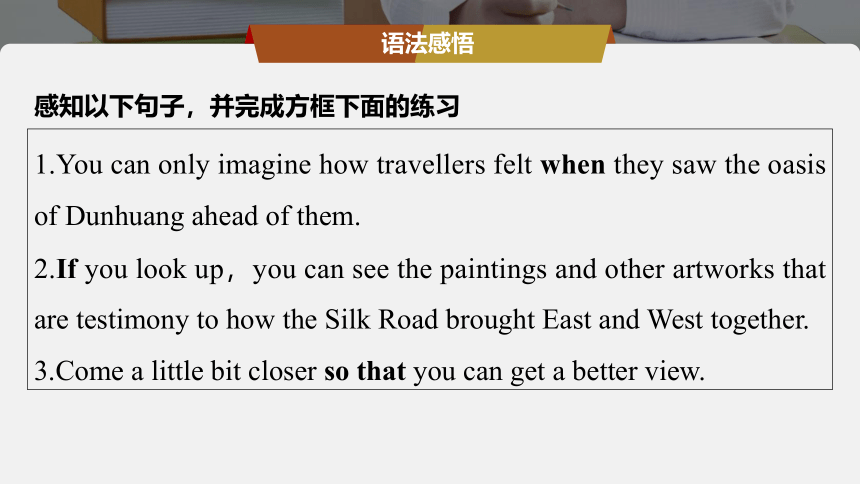
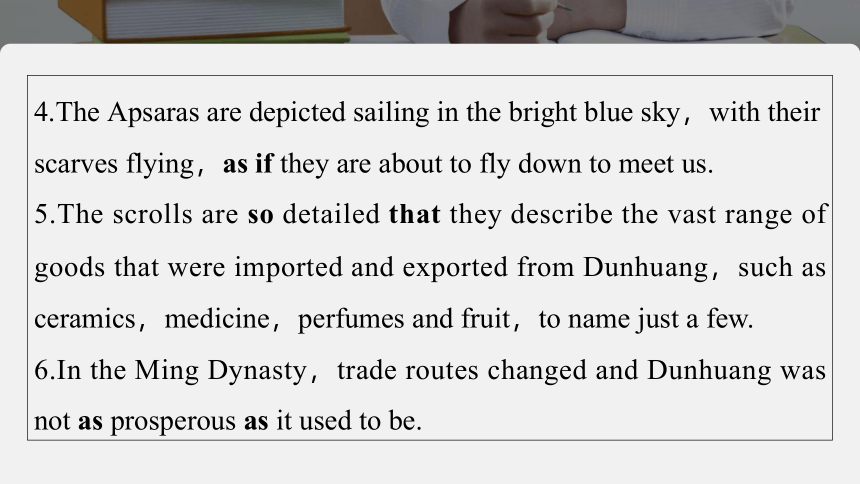
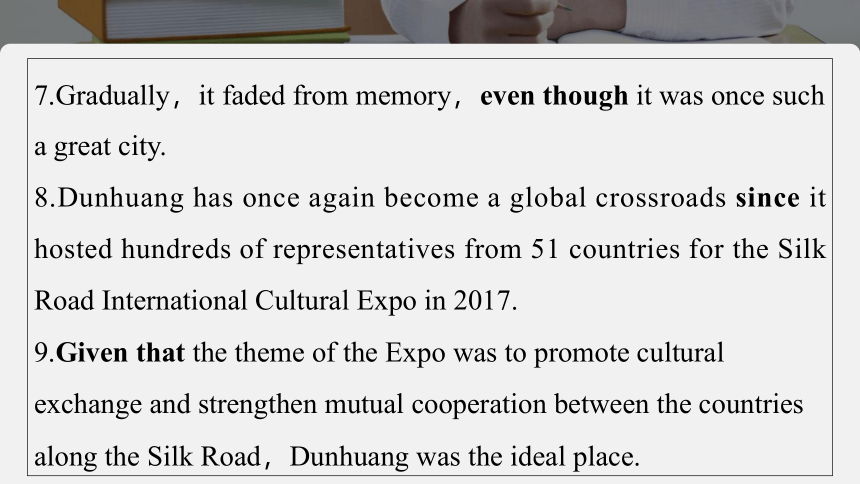
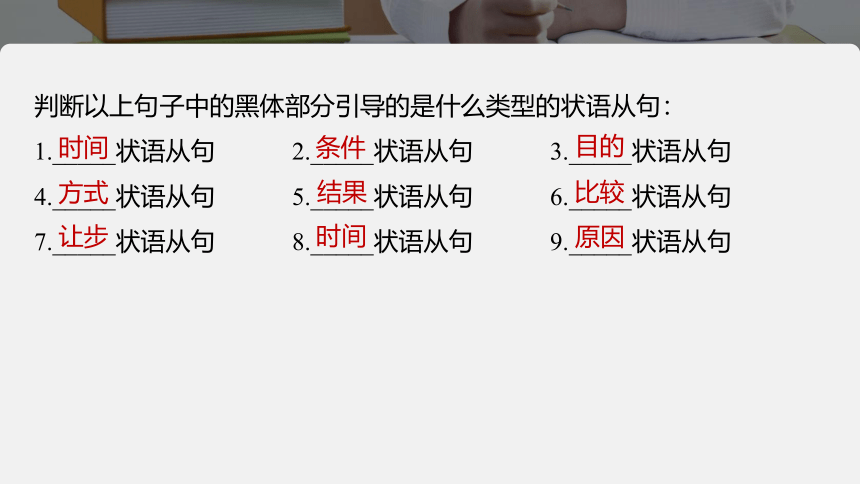

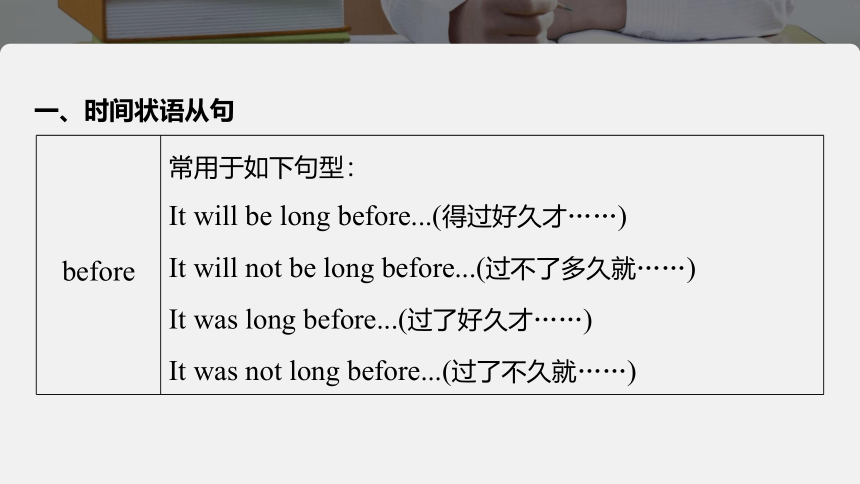

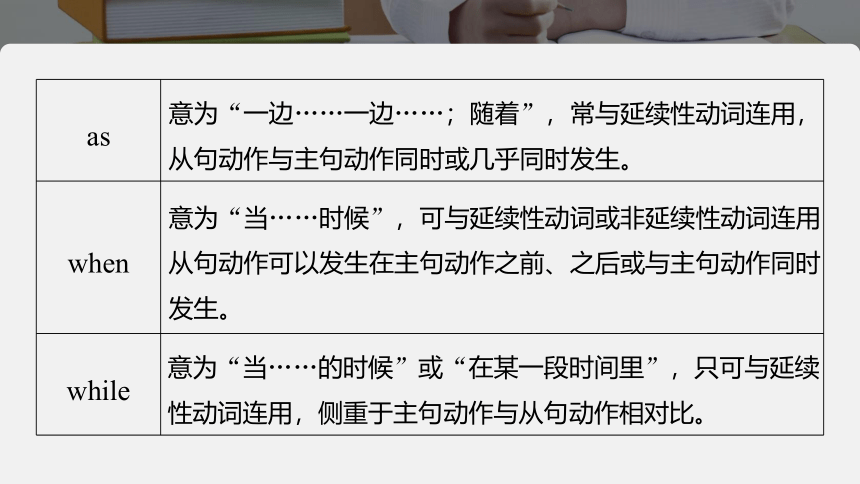


文档简介
(共39张PPT)
The world meets China
Unit 3
Using language
—Review:adverbial clauses
语法感悟
感知以下句子,并完成方框下面的练习
1.You can only imagine how travellers felt when they saw the oasis of Dunhuang ahead of them.
2.If you look up,you can see the paintings and other artworks that are testimony to how the Silk Road brought East and West together.
3.Come a little bit closer so that you can get a better view.
4.The Apsaras are depicted sailing in the bright blue sky,with their scarves flying,as if they are about to fly down to meet us.
5.The scrolls are so detailed that they describe the vast range of goods that were imported and exported from Dunhuang,such as ceramics,medicine,perfumes and fruit,to name just a few.
6.In the Ming Dynasty,trade routes changed and Dunhuang was not as prosperous as it used to be.
7.Gradually,it faded from memory,even though it was once such a great city.
8.Dunhuang has once again become a global crossroads since it hosted hundreds of representatives from 51 countries for the Silk Road International Cultural Expo in 2017.
9.Given that the theme of the Expo was to promote cultural exchange and strengthen mutual cooperation between the countries along the Silk Road,Dunhuang was the ideal place.
判断以上句子中的黑体部分引导的是什么类型的状语从句:
1._____状语从句 2._____状语从句 3._____状语从句
4._____状语从句 5._____状语从句 6._____状语从句
7._____状语从句 8._____状语从句 9._____状语从句
时间
条件
目的
方式
结果
比较
让步
时间
原因
状语从句(Adverbial Clauses)是指在句子中作状语,起副词作用的从句。状语从句可以修饰谓语、非谓语动词、定语、状语或整个句子。放在句首时,一般在从句后加逗号;放在句尾时,一般不在从句前加逗号。
状语从句根据其作用一般分为:时间状语从句;地点状语从句;原因状语从句;条件状语从句;目的状语从句;结果状语从句;方式状语从句;让步状语从句;比较状语从句等。
语法精讲
一、时间状语从句
before 常用于如下句型:
It will be long before...(得过好久才……)
It will not be long before...(过不了多久就……)
It was long before...(过了好久才……)
It was not long before...(过了不久就……)
since 意为“自……以来”,从句的谓语动词一般是非延续性动词,主句的谓语动词一般是延续性动词。since从句的时态若是一般过去时,主句常用现在完成时或现在完成进行时。此外,since常用于以下句型:
It is/has been+时间段+since从句(常用一般过去时)。
as 意为“一边……一边……;随着”,常与延续性动词连用,从句动作与主句动作同时或几乎同时发生。
when 意为“当……时候”,可与延续性动词或非延续性动词连用,从句动作可以发生在主句动作之前、之后或与主句动作同时发生。
while 意为“当……的时候”或“在某一段时间里”,只可与延续性动词连用,侧重于主句动作与从句动作相对比。
其他 连词 引导时间状语从句的连接词除上述外还有:
1.till,not...until...,until
2.hardly/scarcely...when...,no sooner...than...表示“一……就……”
3.directly,immediately,instantly,the moment,the minute,the second,the instant,as soon as意为“一……就……”
4.each time,every time,the first time等
Air pollution is getting more and more serious,so we must take action before it is too late.
空气污染变得越来越严重,因此我们必须趁早采取行动。
I have fallen in love with journalism since I was a child.
从孩提时代起我就爱上了新闻工作。
As he grew older,he became less active.
随着他慢慢长大,他变得不那么活跃了。
Shaking hands is the most popular way to greet each other when people meet.
人们见面时,握手是最普遍的打招呼的方式。
While watching TV,children do not merely absorb words and images.
看电视的时候,孩子们接收到的不仅仅是文字和图像。
Not until we succeed in letting wildlife live in peace can we smile in relief.
直到我们成功地让野生动物平静地生活,我们才能如释重负地微笑。
He had no sooner finished his speech than the students started cheering.
他刚完成演讲学生们就欢呼起来。
I was so tired that I fell asleep the moment/as soon as/the instant my head touched the pillow.
我太累了,头一碰到枕头我就睡着了。
二、地点状语从句和条件状语从句
地点状语从句 where,wherever可引导地点状语从句。
条件状语从句 1.引导条件状语从句的常见从属连词(短语)有if,unless,as/so long as,in case(万一),on condition that,provided/providing (that),supposing/suppose (that),assuming that(假设)等。
2.在条件状语从句中,用一般现在时代替一般将来时。
Wherever she goes,there are crowds of people waiting to see her.
不管她去哪里,总是有成群的人等着要见她。
Some parents will buy any high-tech toy if they think it will help their children.
一些家长认为,如果高科技玩具对他们的孩子有帮助,他们都会购买。
He will never make progress in math unless he really wants to learn it.
除非他真的想学数学,否则他永远不会在数学上取得进步。
My parents don’t mind what job I do as/so long as I am happy.
只要我高兴,我的父母并不介意我做什么工作。
They agree to lend us the car on condition that we return it before the weekend.
他们同意把车借给我们,条件是我们在周末前归还。
Supposing/Suppose that they refuse us,who else can we turn to for help
如果他们拒绝了我们,我们还能向谁求助呢?
三、原因状语从句
because 用来回答why的提问,语气最强,一般放在主句之后。
since/now that 表示已知的理由、稍加分析即可表明的原因,多放在句首。
as 引导的从句常放在句首,说明次要的原因,主句说明结果,常用于口语中(注意,for连接的是并列句)。
其他连词 引导原因状语从句的其他从属连词还有:
seeing that(鉴于,由于),in that(因为),considering(that)
(考虑到),when(既然),given that(鉴于,考虑到)等。
Since/Now that you’ve listed your strengths,list your imperfections.
既然你已经列出了你的优点,那再说说你的缺点吧。
As he is a tailor,he knows what to do with this material.
由于他是个裁缝,他知道怎样利用这块布料。
The engine stopped running in that the fuel was used up.
因为燃料用尽,发动机停止了运转。
Why do you take a taxi when you could go there on foot in five minutes
既然步行五分钟就能到那里,你为什么要乘坐出租车?
Given that they’re inexperienced,they’ve done a good job.
在缺乏经验的情况下,他们的工作已经做得相当不错了。
四、让步状语从句
though,although,as,even if/though,whether...or...,while等引导的让步状语从句 1.although与though可以引导让步状语从句,不能与but连用,但可以与yet连用。
2.even if 或even though引导让步状语从句,表示“即使,纵然”,用来使人注意下文所强调的内容。
though,although,as,even if/though,whether...or...,while等引导的让步状语从句 3.as也可以引导让步状语从句,需将从句中的表语、状语以及谓语中的实义动词提前至从句句首,引起倒装;作表语的单数可数名词前如有冠词,冠词需省去。though引导的让步状语从句也可以倒装,但although引导的不可以。
4.while也可以引导让步状语从句,表示“尽
管”,比though/although语气弱。while引导的让步状语从句一般要位于句首。
“no matter+疑问词”或“疑问词+ -ever”引导的让步状语从句 no matter后接who,what,where,how等疑问词引导让步状语从句,也可以在这类疑问词后面加上-ever构成whoever,whatever,wherever,however等。但在引导名词性从句时,只能用“疑问词+-ever”。
While/Although/Though Tom is very good at science,his brother is absolutely hopeless.
虽然汤姆理科很好,但他的兄弟却极差。
I’ll do it,even if/though it takes me all the afternoon.
即使这会花费我一下午的时间,我也要做。
He was unable to make much progress,hard as he tried.
尽管他努力了,但仍不能取得多大的进步。
We’ll go on with the work whether we can find the necessary tools or not.
无论我们能否找到需要的工具,我们都要继续工作。
Don’t trust him,no matter what he says.
无论他说什么,都不要相信他。
The athletes,especially the winners,should remain modest however rapid progress they have made.
运动员,尤其是得奖的运动员,不管进步多快,都应该保持谦虚。
五、其他状语从句
目的状语从句 in order that与so that引导的目的状语从句:
两个连词都意为“以便……;为了……”,其引导的状语从句中谓语常用“can/could/may/might/will/would+动词原形”。in order that比so that正式,引导的状语从句可置于主句之前或之后;而so that引导的从句只能置于主句之后。
for fear that与in case引导的目的状语从句:
for fear that表示“唯恐;生怕”;in case表示“以免,以防”。
结果状语从句 引导结果状语从句的从属连词有:so that,so...that...,such...that...
除结果状语从句外,too...to...,...enough to...,so...as to...,such...as to...等不定式结构同样可以表示结果。
方式状语从句 引导方式状语从句的从属连词有:as,as if/as though。as if或as though引导的从句与事实相反时,通常用虚拟语气:与现在事实相反,从句用一般过去时;与过去事实相反,从句谓语用“had+过去分词”;与将来事实相反,从句谓语用“would/could/might+动词原形”。从句内容与事实相符或可能成为事实时,则用陈述语气。
比较状语从句 比较状语从句一般位于句尾,常用as...as,not as/so...as,比较级+than引导。
It’s better to send the heavy cases in advance so that they’ll be there when we arrive.
最好事先把这些沉重的箱子送到,这样我们到达时,它们就已经在那了。
He speaks so slowly and strangely that it takes patience to understand what he is saying.
他说得如此缓慢而又奇怪,以至于需要耐心才能理解他在说什么。
They treat her as though/if she were their daughter.
他们对待她就像对待自己的女儿一样。
It is wise to have as many good friends as we can.
有尽可能多的好朋友是明智的。
六、状语从句的省略
1.时间、让步、方式、地点状语从句的省略
如果状语从句的主语与主句的主语一致或从句的主语是it,而且状语从句的谓语中有be动词时,可以将从句中的主语连同be动词一起省略。
While (I was) in Beijing,I paid a visit to the Summer Palace.
在北京时,我参观了颐和园。
He often makes mistakes when (he is) speaking English.
说英语时他经常出错。
The woman teacher left the classroom silently as though (she was) angry.
这位女老师默默地离开了教室,好像生气了。
Though (it was) cold,he still wore a shirt.
虽然天气冷,但他仍然穿了一件衬衫。
2.条件状语从句的省略
(1)在if it is possible,if it is necessary,when it is necessary等类似结构中,常省略it is。
Come tomorrow if(it is) possible.
如果可能的话就明天来吧。
Unless (it is) necessary,you’d better not refer to the dictionary.
除非有必要,否则你最好不要查词典。
(2)在虚拟条件句中连词if的省略。在虚拟条件句中,如果从句谓语中含有had/were/should,if 可省略,把had/were/should提至句首引起倒装。
Were I(=If I were) twenty now,I would join the army.
如果我现在二十岁,我就参军。
Had you come(=If you had come) yesterday,you would have met her.
如果你昨天来,你就见到她了。
Should there be(=If there should be) a flood,what should we do
万一发生洪水,我们该怎么办?
教材听力训练(见课堂精彩PPT)
短文填空
1.______ I put forward the suggestion that he go to work in the countryside,Li Ming promised to take it into account,just 2.______ he graduated from an agricultural university.Of course,it means living in the countryside for at least three years or more 3.________ he returns to the city.Li Ming studied hard at university.
达标检测
When
before
before
4.__________ he had time,he would go to the library to search for more information.I wanted him to work in the countryside 5.________ he could help rid people there of hunger by expanding the output of crop.6.______ there may be little entertainment in the faraway area,I advised him to take his guitar with him 7.______ he could entertain himself sometimes.I also advised him to be modest 8.____________ working with the farmers 9.__________________ he knows more scientific knowledge than they do.10.____________________ he hasn’t made any answer so far,I think he will follow my advice.
Whenever
because
Since
so that
when/while
even if/though
Though/Although/While
本课结束
The world meets China
Unit 3
Using language
—Review:adverbial clauses
语法感悟
感知以下句子,并完成方框下面的练习
1.You can only imagine how travellers felt when they saw the oasis of Dunhuang ahead of them.
2.If you look up,you can see the paintings and other artworks that are testimony to how the Silk Road brought East and West together.
3.Come a little bit closer so that you can get a better view.
4.The Apsaras are depicted sailing in the bright blue sky,with their scarves flying,as if they are about to fly down to meet us.
5.The scrolls are so detailed that they describe the vast range of goods that were imported and exported from Dunhuang,such as ceramics,medicine,perfumes and fruit,to name just a few.
6.In the Ming Dynasty,trade routes changed and Dunhuang was not as prosperous as it used to be.
7.Gradually,it faded from memory,even though it was once such a great city.
8.Dunhuang has once again become a global crossroads since it hosted hundreds of representatives from 51 countries for the Silk Road International Cultural Expo in 2017.
9.Given that the theme of the Expo was to promote cultural exchange and strengthen mutual cooperation between the countries along the Silk Road,Dunhuang was the ideal place.
判断以上句子中的黑体部分引导的是什么类型的状语从句:
1._____状语从句 2._____状语从句 3._____状语从句
4._____状语从句 5._____状语从句 6._____状语从句
7._____状语从句 8._____状语从句 9._____状语从句
时间
条件
目的
方式
结果
比较
让步
时间
原因
状语从句(Adverbial Clauses)是指在句子中作状语,起副词作用的从句。状语从句可以修饰谓语、非谓语动词、定语、状语或整个句子。放在句首时,一般在从句后加逗号;放在句尾时,一般不在从句前加逗号。
状语从句根据其作用一般分为:时间状语从句;地点状语从句;原因状语从句;条件状语从句;目的状语从句;结果状语从句;方式状语从句;让步状语从句;比较状语从句等。
语法精讲
一、时间状语从句
before 常用于如下句型:
It will be long before...(得过好久才……)
It will not be long before...(过不了多久就……)
It was long before...(过了好久才……)
It was not long before...(过了不久就……)
since 意为“自……以来”,从句的谓语动词一般是非延续性动词,主句的谓语动词一般是延续性动词。since从句的时态若是一般过去时,主句常用现在完成时或现在完成进行时。此外,since常用于以下句型:
It is/has been+时间段+since从句(常用一般过去时)。
as 意为“一边……一边……;随着”,常与延续性动词连用,从句动作与主句动作同时或几乎同时发生。
when 意为“当……时候”,可与延续性动词或非延续性动词连用,从句动作可以发生在主句动作之前、之后或与主句动作同时发生。
while 意为“当……的时候”或“在某一段时间里”,只可与延续性动词连用,侧重于主句动作与从句动作相对比。
其他 连词 引导时间状语从句的连接词除上述外还有:
1.till,not...until...,until
2.hardly/scarcely...when...,no sooner...than...表示“一……就……”
3.directly,immediately,instantly,the moment,the minute,the second,the instant,as soon as意为“一……就……”
4.each time,every time,the first time等
Air pollution is getting more and more serious,so we must take action before it is too late.
空气污染变得越来越严重,因此我们必须趁早采取行动。
I have fallen in love with journalism since I was a child.
从孩提时代起我就爱上了新闻工作。
As he grew older,he became less active.
随着他慢慢长大,他变得不那么活跃了。
Shaking hands is the most popular way to greet each other when people meet.
人们见面时,握手是最普遍的打招呼的方式。
While watching TV,children do not merely absorb words and images.
看电视的时候,孩子们接收到的不仅仅是文字和图像。
Not until we succeed in letting wildlife live in peace can we smile in relief.
直到我们成功地让野生动物平静地生活,我们才能如释重负地微笑。
He had no sooner finished his speech than the students started cheering.
他刚完成演讲学生们就欢呼起来。
I was so tired that I fell asleep the moment/as soon as/the instant my head touched the pillow.
我太累了,头一碰到枕头我就睡着了。
二、地点状语从句和条件状语从句
地点状语从句 where,wherever可引导地点状语从句。
条件状语从句 1.引导条件状语从句的常见从属连词(短语)有if,unless,as/so long as,in case(万一),on condition that,provided/providing (that),supposing/suppose (that),assuming that(假设)等。
2.在条件状语从句中,用一般现在时代替一般将来时。
Wherever she goes,there are crowds of people waiting to see her.
不管她去哪里,总是有成群的人等着要见她。
Some parents will buy any high-tech toy if they think it will help their children.
一些家长认为,如果高科技玩具对他们的孩子有帮助,他们都会购买。
He will never make progress in math unless he really wants to learn it.
除非他真的想学数学,否则他永远不会在数学上取得进步。
My parents don’t mind what job I do as/so long as I am happy.
只要我高兴,我的父母并不介意我做什么工作。
They agree to lend us the car on condition that we return it before the weekend.
他们同意把车借给我们,条件是我们在周末前归还。
Supposing/Suppose that they refuse us,who else can we turn to for help
如果他们拒绝了我们,我们还能向谁求助呢?
三、原因状语从句
because 用来回答why的提问,语气最强,一般放在主句之后。
since/now that 表示已知的理由、稍加分析即可表明的原因,多放在句首。
as 引导的从句常放在句首,说明次要的原因,主句说明结果,常用于口语中(注意,for连接的是并列句)。
其他连词 引导原因状语从句的其他从属连词还有:
seeing that(鉴于,由于),in that(因为),considering(that)
(考虑到),when(既然),given that(鉴于,考虑到)等。
Since/Now that you’ve listed your strengths,list your imperfections.
既然你已经列出了你的优点,那再说说你的缺点吧。
As he is a tailor,he knows what to do with this material.
由于他是个裁缝,他知道怎样利用这块布料。
The engine stopped running in that the fuel was used up.
因为燃料用尽,发动机停止了运转。
Why do you take a taxi when you could go there on foot in five minutes
既然步行五分钟就能到那里,你为什么要乘坐出租车?
Given that they’re inexperienced,they’ve done a good job.
在缺乏经验的情况下,他们的工作已经做得相当不错了。
四、让步状语从句
though,although,as,even if/though,whether...or...,while等引导的让步状语从句 1.although与though可以引导让步状语从句,不能与but连用,但可以与yet连用。
2.even if 或even though引导让步状语从句,表示“即使,纵然”,用来使人注意下文所强调的内容。
though,although,as,even if/though,whether...or...,while等引导的让步状语从句 3.as也可以引导让步状语从句,需将从句中的表语、状语以及谓语中的实义动词提前至从句句首,引起倒装;作表语的单数可数名词前如有冠词,冠词需省去。though引导的让步状语从句也可以倒装,但although引导的不可以。
4.while也可以引导让步状语从句,表示“尽
管”,比though/although语气弱。while引导的让步状语从句一般要位于句首。
“no matter+疑问词”或“疑问词+ -ever”引导的让步状语从句 no matter后接who,what,where,how等疑问词引导让步状语从句,也可以在这类疑问词后面加上-ever构成whoever,whatever,wherever,however等。但在引导名词性从句时,只能用“疑问词+-ever”。
While/Although/Though Tom is very good at science,his brother is absolutely hopeless.
虽然汤姆理科很好,但他的兄弟却极差。
I’ll do it,even if/though it takes me all the afternoon.
即使这会花费我一下午的时间,我也要做。
He was unable to make much progress,hard as he tried.
尽管他努力了,但仍不能取得多大的进步。
We’ll go on with the work whether we can find the necessary tools or not.
无论我们能否找到需要的工具,我们都要继续工作。
Don’t trust him,no matter what he says.
无论他说什么,都不要相信他。
The athletes,especially the winners,should remain modest however rapid progress they have made.
运动员,尤其是得奖的运动员,不管进步多快,都应该保持谦虚。
五、其他状语从句
目的状语从句 in order that与so that引导的目的状语从句:
两个连词都意为“以便……;为了……”,其引导的状语从句中谓语常用“can/could/may/might/will/would+动词原形”。in order that比so that正式,引导的状语从句可置于主句之前或之后;而so that引导的从句只能置于主句之后。
for fear that与in case引导的目的状语从句:
for fear that表示“唯恐;生怕”;in case表示“以免,以防”。
结果状语从句 引导结果状语从句的从属连词有:so that,so...that...,such...that...
除结果状语从句外,too...to...,...enough to...,so...as to...,such...as to...等不定式结构同样可以表示结果。
方式状语从句 引导方式状语从句的从属连词有:as,as if/as though。as if或as though引导的从句与事实相反时,通常用虚拟语气:与现在事实相反,从句用一般过去时;与过去事实相反,从句谓语用“had+过去分词”;与将来事实相反,从句谓语用“would/could/might+动词原形”。从句内容与事实相符或可能成为事实时,则用陈述语气。
比较状语从句 比较状语从句一般位于句尾,常用as...as,not as/so...as,比较级+than引导。
It’s better to send the heavy cases in advance so that they’ll be there when we arrive.
最好事先把这些沉重的箱子送到,这样我们到达时,它们就已经在那了。
He speaks so slowly and strangely that it takes patience to understand what he is saying.
他说得如此缓慢而又奇怪,以至于需要耐心才能理解他在说什么。
They treat her as though/if she were their daughter.
他们对待她就像对待自己的女儿一样。
It is wise to have as many good friends as we can.
有尽可能多的好朋友是明智的。
六、状语从句的省略
1.时间、让步、方式、地点状语从句的省略
如果状语从句的主语与主句的主语一致或从句的主语是it,而且状语从句的谓语中有be动词时,可以将从句中的主语连同be动词一起省略。
While (I was) in Beijing,I paid a visit to the Summer Palace.
在北京时,我参观了颐和园。
He often makes mistakes when (he is) speaking English.
说英语时他经常出错。
The woman teacher left the classroom silently as though (she was) angry.
这位女老师默默地离开了教室,好像生气了。
Though (it was) cold,he still wore a shirt.
虽然天气冷,但他仍然穿了一件衬衫。
2.条件状语从句的省略
(1)在if it is possible,if it is necessary,when it is necessary等类似结构中,常省略it is。
Come tomorrow if(it is) possible.
如果可能的话就明天来吧。
Unless (it is) necessary,you’d better not refer to the dictionary.
除非有必要,否则你最好不要查词典。
(2)在虚拟条件句中连词if的省略。在虚拟条件句中,如果从句谓语中含有had/were/should,if 可省略,把had/were/should提至句首引起倒装。
Were I(=If I were) twenty now,I would join the army.
如果我现在二十岁,我就参军。
Had you come(=If you had come) yesterday,you would have met her.
如果你昨天来,你就见到她了。
Should there be(=If there should be) a flood,what should we do
万一发生洪水,我们该怎么办?
教材听力训练(见课堂精彩PPT)
短文填空
1.______ I put forward the suggestion that he go to work in the countryside,Li Ming promised to take it into account,just 2.______ he graduated from an agricultural university.Of course,it means living in the countryside for at least three years or more 3.________ he returns to the city.Li Ming studied hard at university.
达标检测
When
before
before
4.__________ he had time,he would go to the library to search for more information.I wanted him to work in the countryside 5.________ he could help rid people there of hunger by expanding the output of crop.6.______ there may be little entertainment in the faraway area,I advised him to take his guitar with him 7.______ he could entertain himself sometimes.I also advised him to be modest 8.____________ working with the farmers 9.__________________ he knows more scientific knowledge than they do.10.____________________ he hasn’t made any answer so far,I think he will follow my advice.
Whenever
because
Since
so that
when/while
even if/though
Though/Although/While
本课结束
